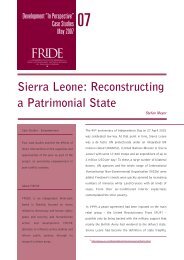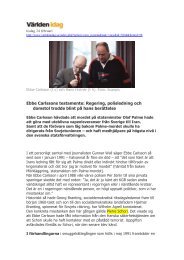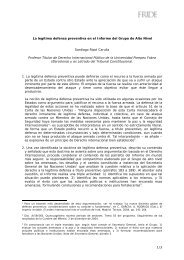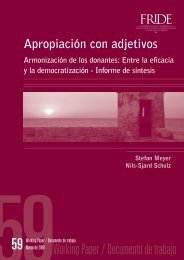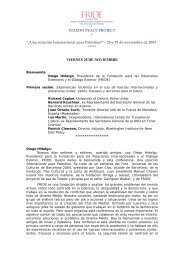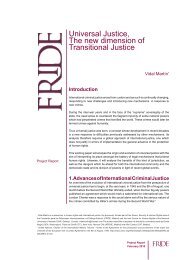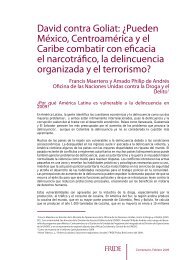Quick Fix or Quicksand? Implementing the EU Sahel Strategy - FRIDE
Quick Fix or Quicksand? Implementing the EU Sahel Strategy - FRIDE
Quick Fix or Quicksand? Implementing the EU Sahel Strategy - FRIDE
You also want an ePaper? Increase the reach of your titles
YUMPU automatically turns print PDFs into web optimized ePapers that Google loves.
6<br />
WORKING PAPER 114<br />
complained about Bamako’s lax attitude towards terr<strong>or</strong>ism in <strong>the</strong> <strong>Sahel</strong>, but all <strong>the</strong><br />
while expressing readiness to help rest<strong>or</strong>e <strong>the</strong> rule of law and extend central auth<strong>or</strong>ity<br />
to contested zones in its n<strong>or</strong>th. Instead of <strong>the</strong> hoped f<strong>or</strong> improvement, a January 2012<br />
rebellion saw n<strong>or</strong><strong>the</strong>rn Mali fall to <strong>the</strong> control of a Taliban-like coalition of jihadists<br />
and nationalists. This development carries serious implications f<strong>or</strong> <strong>the</strong> country, <strong>the</strong><br />
region and <strong>the</strong> <strong>EU</strong>.<br />
First, <strong>the</strong> scale and capacity of <strong>the</strong> rebel offensive led by <strong>the</strong> Tuareg National<br />
Movement f<strong>or</strong> <strong>the</strong> Liberation of <strong>the</strong> Azawad (MNLA) 19 is certainly unprecedented.<br />
Bolstered by sophisticated arms from Libya, <strong>the</strong> rebellion quickly overwhelmed Mali’s<br />
under-equipped and dem<strong>or</strong>alised army. The scale of <strong>the</strong> crisis also dwarfs <strong>the</strong> limited<br />
regional capacity f<strong>or</strong> a military response. Most crucially, <strong>the</strong> Malian government’s<br />
handling of challenges old and new has been incompetent. Whilst moderate Tuaregs<br />
have reached out to <strong>the</strong> central government in Bamako, <strong>the</strong> Malian military has<br />
maintained an uncompromising stance even though it lacks <strong>the</strong> capacity to impose<br />
a military solution in <strong>the</strong> n<strong>or</strong>th. This continues a long established pattern: in 2010,<br />
<strong>the</strong> government rejected offers from Tuareg rebel leaders to fight and expel AQIM<br />
from <strong>the</strong> n<strong>or</strong>th of <strong>the</strong> country. Bamako’s lukewarm reception had undoubtedly been<br />
influenced by <strong>the</strong> long-standing distrust between <strong>the</strong> two sides.<br />
Second, with terr<strong>or</strong> groups and separatist movements in <strong>the</strong> <strong>Sahel</strong> now resurgent and<br />
streng<strong>the</strong>ned, <strong>the</strong> generalised insecurity is undermining needed cooperation among<br />
regional states. In particular, AQIM-allied groups have opp<strong>or</strong>tunistically ousted <strong>the</strong><br />
Tuareg separatists to consolidate Islamist control over n<strong>or</strong><strong>the</strong>rn Mali. 20 AQIM is also<br />
proving increasingly adept at projecting influence across <strong>the</strong> region, from Libya’s<br />
unstable south, through Mauritania and Niger to Nigeria’s volatile n<strong>or</strong><strong>the</strong>rn fringes.<br />
Previously marginal <strong>or</strong> little known groups such as <strong>the</strong> Ansar Deen and Nigeria’s<br />
Boko Haram have <strong>the</strong>ref<strong>or</strong>e gained strength on <strong>the</strong> back of <strong>the</strong> Malian upheaval.<br />
These developments have fur<strong>the</strong>r complicated <strong>the</strong> <strong>EU</strong>’s ability to master <strong>the</strong> terrain.<br />
Third, regional and international responses to Mali’s territ<strong>or</strong>ial disintegration are inchoate<br />
and potentially w<strong>or</strong>sening insecurity levels. As AQIM evolves from a local group to <strong>the</strong> de<br />
facto government, ruling an enclave <strong>the</strong> size of France in n<strong>or</strong><strong>the</strong>rn Mali, huge implications<br />
are emerging f<strong>or</strong> <strong>the</strong> <strong>Sahel</strong> <strong>Strategy</strong>’s implementation. Mali’s state institutions have been<br />
strained by <strong>the</strong> multi-level political and military crisis, challenging <strong>the</strong> strategy’s focus on<br />
w<strong>or</strong>king with and streng<strong>the</strong>ning state act<strong>or</strong>s in <strong>the</strong> region. Whilst <strong>EU</strong> non-humanitarian<br />
aid to <strong>the</strong> country was suspended in <strong>the</strong> aftermath of a 21 March military coup in <strong>the</strong><br />
capital, <strong>the</strong> gradual resumption of development cooperation is essential to sh<strong>or</strong>e up<br />
social service delivery and <strong>the</strong> fragile new transitional administration.<br />
Regional diplomatic eff<strong>or</strong>ts have meanwhile failed to make a breakthrough. AQIMaffiliated<br />
groups such as <strong>the</strong> Movement f<strong>or</strong> Oneness of Jihad in West Africa (MUJAO)<br />
and Ansar Deen have been able to use de facto control of territ<strong>or</strong>y in Mali’s n<strong>or</strong>th as<br />
leverage in ECOWAS led diplomatic negotiations with insurgents. Fragmentation<br />
19. The group’s name in French is <strong>the</strong> Mouvement National pour la Libération de l’Azawad (MNLA).<br />
20. The Al-Qaeda allied MUJAO and Ansar Deen aim to extend <strong>the</strong> sharia throughout Mali as a whole, as opposed to <strong>the</strong> MNLA’s secularist objective<br />
of founding an Azawad home-state in Mali’s n<strong>or</strong>th.



